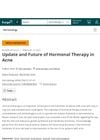 27 citations
,
July 2009 in “Experimental and Clinical Endocrinology & Diabetes”
27 citations
,
July 2009 in “Experimental and Clinical Endocrinology & Diabetes” Finasteride safely reduces excessive hair growth in women.
 169 citations
,
August 2004 in “Baillière's best practice & research. Clinical obstetrics & gynaecology/Baillière's best practice and research in clinical obstetrics and gynaecology”
169 citations
,
August 2004 in “Baillière's best practice & research. Clinical obstetrics & gynaecology/Baillière's best practice and research in clinical obstetrics and gynaecology” Lower doses of treatments for hirsutism and acne in PCOS are effective and cause fewer side effects.
 131 citations
,
August 2004 in “Best Practice & Research in Clinical Obstetrics & Gynaecology”
131 citations
,
August 2004 in “Best Practice & Research in Clinical Obstetrics & Gynaecology” The conclusion is that PCOS is caused by ovarian sensitivity to hormones and disrupted hormone control, possibly due to ovarian factors, and more research is needed.
 278 citations
,
August 2004 in “Best Practice & Research in Clinical Obstetrics & Gynaecology”
278 citations
,
August 2004 in “Best Practice & Research in Clinical Obstetrics & Gynaecology” Polycystic ovaries are defined by having 12 or more small follicles in each ovary and are found in up to 33% of women, while Polycystic Ovary Syndrome (PCOS) is the most common hormone disorder in women of reproductive age, potentially increasing risk of obesity, diabetes, and heart diseases.
24 citations
,
January 2004 in “The scientific world journal/TheScientificWorldjournal” HAIR-AN syndrome is common in young women and can be effectively managed with a comprehensive treatment plan.
 12 citations
,
January 2004 in “Reproductive biomedicine online”
12 citations
,
January 2004 in “Reproductive biomedicine online” Low-dose anti-androgen drugs and certain drug combinations are effective for hirsutism, and insulin sensitizers show promise, especially for those with polycystic ovarian syndrome.
 84 citations
,
November 2003 in “European journal of endocrinology”
84 citations
,
November 2003 in “European journal of endocrinology” Women with androgenic alopecia are more likely to have polycystic ovaries and higher androgen levels, which may indicate PCOS.
 192 citations
,
September 2003 in “The Journal of clinical endocrinology and metabolism/Journal of clinical endocrinology & metabolism”
192 citations
,
September 2003 in “The Journal of clinical endocrinology and metabolism/Journal of clinical endocrinology & metabolism” Metformin is effective for treating excessive hair growth in women with PCOS and may work better than the standard treatment in some ways.
 195 citations
,
May 2003 in “Obstetrics and gynecology (New York. 1953. Online)/Obstetrics and gynecology”
195 citations
,
May 2003 in “Obstetrics and gynecology (New York. 1953. Online)/Obstetrics and gynecology” Most women with excess hair growth have an underlying hormonal issue, often treated with medication and hair removal methods.
 78 citations
,
January 2003 in “Dermatology”
78 citations
,
January 2003 in “Dermatology” Hormonal therapy is becoming a promising treatment for acne.
 51 citations
,
October 2002 in “European journal of endocrinology”
51 citations
,
October 2002 in “European journal of endocrinology” Low-dose finasteride effectively treats hirsutism, is safe, and cost-effective.
 90 citations
,
August 2002 in “European journal of endocrinology”
90 citations
,
August 2002 in “European journal of endocrinology” Metformin improves hair growth and menstrual frequency in women with PCOS and hirsutism.
 68 citations
,
April 2002 in “Journal of Alternative and Complementary Medicine”
68 citations
,
April 2002 in “Journal of Alternative and Complementary Medicine” Natural 5AR inhibitors effectively improve mild to moderate hair loss in men.
61 citations
,
January 2002 in “American Journal of Clinical Dermatology”  115 citations
,
January 2001 in “American journal of clinical dermatology”
115 citations
,
January 2001 in “American journal of clinical dermatology” Eflornithine cream effectively reduces women's unwanted facial hair but hair returns if treatment stops.
 50 citations
,
May 2000 in “Fertility and Sterility”
50 citations
,
May 2000 in “Fertility and Sterility” Flutamide reduces hair growth better but has more side effects.
55 citations
,
March 2000 in “American journal of clinical dermatology” Antiandrogens, particularly flutamide and CPA, are most effective for treating hirsutism, with long-term use needed for best results.
46 citations
,
January 2000 in “The Journal of Clinical Endocrinology and Metabolism”  70 citations
,
January 2000 in “Hormone Research in Paediatrics”
70 citations
,
January 2000 in “Hormone Research in Paediatrics” SAHA syndrome is a condition in women involving skin and hair issues, often related to hormonal imbalances, and is treated based on the underlying cause.
 75 citations
,
October 1999 in “European journal of endocrinology”
75 citations
,
October 1999 in “European journal of endocrinology” Finasteride is a safe, effective treatment for hirsutism with fewer side effects.
 23 citations
,
April 1999 in “The Journal of Clinical Endocrinology and Metabolism”
23 citations
,
April 1999 in “The Journal of Clinical Endocrinology and Metabolism” All treatments reduce hair growth; low dose flutamide most effective with fewer side effects.
 20 citations
,
January 1999 in “Current Pharmaceutical Design”
20 citations
,
January 1999 in “Current Pharmaceutical Design” Antiandrogen therapy is effective and well tolerated for treating women's androgenic disorders like hirsutism, acne, and hair loss.
 30 citations
,
January 1998 in “Dermatology”
30 citations
,
January 1998 in “Dermatology” Birth control pills and cyproterone acetate can help treat acne in women, especially when linked to hormonal issues.
29 citations
,
January 1998 in “Dermatology” Many acne patients have high androgen levels, which may lead to PCOD, but treatments like oral contraceptives and antiandrogens can help.
 76 citations
,
December 1997 in “Fertility and Sterility”
76 citations
,
December 1997 in “Fertility and Sterility” Finasteride reduces hair growth better, but spironolactone has more side effects.
 50 citations
,
July 1996 in “Fertility and Sterility”
50 citations
,
July 1996 in “Fertility and Sterility” Finasteride effectively treats hirsutism in women, but more research needed for long-term results.
1947 citations
,
September 1995 in “New England journal of medicine/The New England journal of medicine” PCOS is a common hormonal disorder causing irregular periods and increased hair growth, linked to insulin resistance and long-term health issues.
 57 citations
,
August 1995 in “British Journal of Dermatology”
57 citations
,
August 1995 in “British Journal of Dermatology” Acne severity is linked to higher levels of certain androgenic hormones, even when those levels are within the normal range.
 135 citations
,
August 1994 in “Clinical Endocrinology”
135 citations
,
August 1994 in “Clinical Endocrinology” Most women with hirsutism or androgenic alopecia had polycystic ovaries, especially if they had irregular periods.
19 citations
,
March 1994 in “Fertility and sterility” The combination therapy reduced hirsutism in women with PCOD and was well-tolerated.
 165 citations
,
February 1994 in “Fertility and Sterility”
165 citations
,
February 1994 in “Fertility and Sterility” Flutamide is more effective and has fewer side effects than spironolactone for treating hirsutism.
94 citations
,
July 1991 in “Clinical endocrinology” Cyproterone acetate at 2mg daily is as effective as higher doses for treating excessive hair growth in women.
 46 citations
,
August 1990 in “The Journal of clinical endocrinology and metabolism/Journal of clinical endocrinology & metabolism”
46 citations
,
August 1990 in “The Journal of clinical endocrinology and metabolism/Journal of clinical endocrinology & metabolism” Ketoconazole reduced hair growth and improved acne in women, but caused side effects needing careful monitoring.
 17 citations
,
February 1989 in “Fertility and sterility”
17 citations
,
February 1989 in “Fertility and sterility” Cimetidine did not reduce hair growth in women with hirsutism.
 80 citations
,
January 1988 in “The Journal of clinical endocrinology and metabolism/Journal of clinical endocrinology & metabolism”
80 citations
,
January 1988 in “The Journal of clinical endocrinology and metabolism/Journal of clinical endocrinology & metabolism” Spironolactone can cause side effects like irregular bleeding, but lower doses may reduce these effects and still improve hirsutism.
 19 citations
,
March 1987 in “International Journal of Dermatology”
19 citations
,
March 1987 in “International Journal of Dermatology” A drug called cimetidine can help treat hair loss in women by blocking androgen receptors. However, it's not the first choice and needs more research.
32 citations
,
August 1985 in “Clinical endocrinology” Spironolactone may help reduce hair growth and testosterone levels in some women with hirsutism.
21 citations
,
March 1982 in “JAMA” Spironolactone is effective and safe for treating excessive facial hair in women.
































